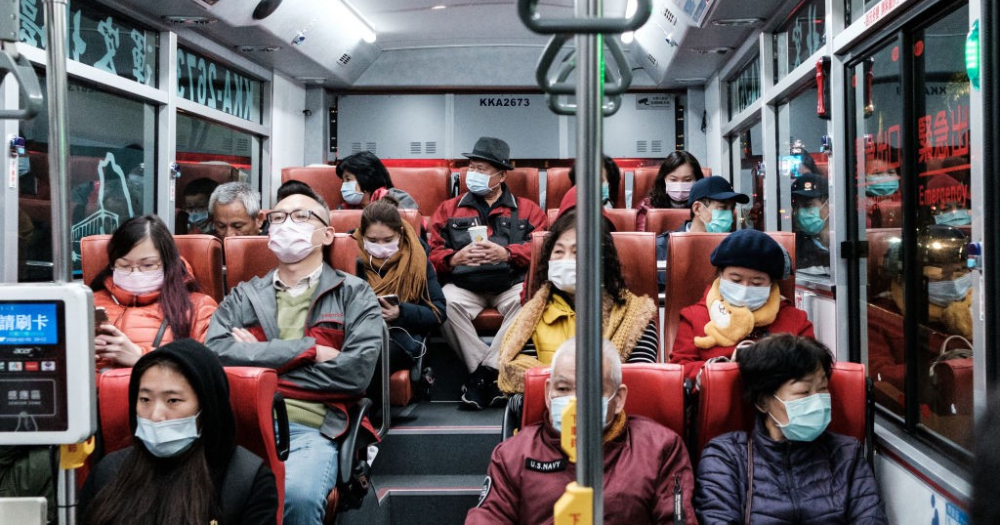Taiwan has been credited for its fast and effective response to the Covid-19 outbreak, limiting infections to 440 cases and six deaths in a population of 24 million, as of May 10.
Set in place measures before it identified first Covid-19 case
This achievement is in spite of the self-ruled island's close proximity to mainland China -- Taiwan is located just 130km away.
Ahead of other countries, Taiwan had set in place various measures even before it identified its first Covid-19 case from Wuhan on Jan. 21.
For instance, it started screening Wuhan arrivals from Dec. 31, and activated its Central Epidemic Command Centre by Jan. 20.
It also stopped tour groups from mainland China from visiting on Jan. 22, and banned arrivals from Hubei province with a few exceptions on Jan. 26.
Internet post sounded the alarm
According to Bloomberg, Taiwan's quick response to the virus outbreak was prompted by an internet bulletin post.
Philip Lo, deputy-general at the Centres for Disease Control, said he first saw a post from PTT -- Taiwan's Reddit-like platform -- at around 5:30am on Dec. 31 last year when he woke up to check social media.
The post, passed to him by his contacts at Line Corp., included a summary of texts and social media posts from medical professionals in mainland China warning about a new strain of pneumonia.
Three hours after he saw the post, his agency asked its mainland Chinese counterpart for more details.
Later in the afternoon, Wuhan reported 27 infections of an unknown disease.
Asked China & WHO about new virus, started screening Wuhan arrivals on Dec. 31
On the same day, Taiwan also told the World Health Organisation (WHO) through an email that infected patients had been isolated for treatment -- a sign taken by Taiwan to mean that the new virus could be passed from human to human.
WHO, however, has since disputed the email to say it did not mention human-to-human transmission at all -- a claim that Taiwan rejected, saying medical professionals would know the circumstances surrounding the need for isolation.
Taiwan also started screening arrivals from Wuhan that evening, sending passengers with fever symptoms to the hospital immediately.
This was before China confirmed human-to-human transmission on Jan. 20.
Action taken despite WHO guidelines
After obtaining permission, Taiwan also sent a fact-finding mission to Wuhan, a week before WHO did.
Sensing the situation was "not optimistic", Taiwan asked hospitals to test for and report cases shortly after the team returned.
The WHO later declared the outbreak a global health emergency on Jan. 31, after maintaining that there is no evidence of human-to-human transmission outside of China.
Even then, the global health body advised against imposing any travel restrictions.
On Feb. 4, WHO urged "all countries not to impose restrictions that unnecessarily interfere with international travel and trade" as such restrictions can increase "fear and stigma with little public health benefit".
Lo said Taiwan would have "fallen behind" if they had followed WHO's guidance, adding they wanted to be "on top of the virus's development right from the beginning".
While the WHO has been criticised for seemingly deferring to China when it comes to the public health crisis, experts say it is misleading to suggest the body, which relies on the goodwill of member countries, has the authority to override a nation's sovereignty and force governments to share information.
Taiwan monitors information in mainland China constantly
Due to frequent cross-strait exchanges in trade and employment, Taiwan is used to monitoring information from mainland Chinese social media and media reports.
In particular, Lo said the WeChat and Weibo platforms -- two apps that are growing increasingly popular among millions of Chinese -- proved to be useful in tracking the mysterious outbreak that started in 2019.
Such a practice has proven useful in the Covid-19 crisis.
Along with suspicion towards information emanating from mainland China, Taiwan's exclusion from WHO and its emergency meetings on Covid-19 might have helped it to be on high alert, forcing it to come up with a unilateral response to the outbreak.
Top image by Jose Lopes Amaral/NurPhoto via Getty Images
If you like what you read, follow us on Facebook, Instagram, Twitter and Telegram to get the latest updates.
